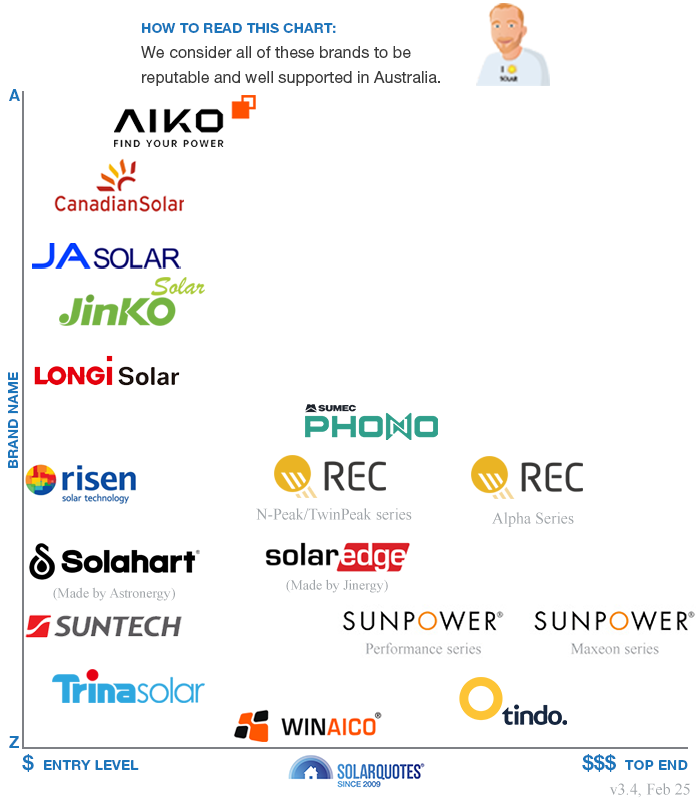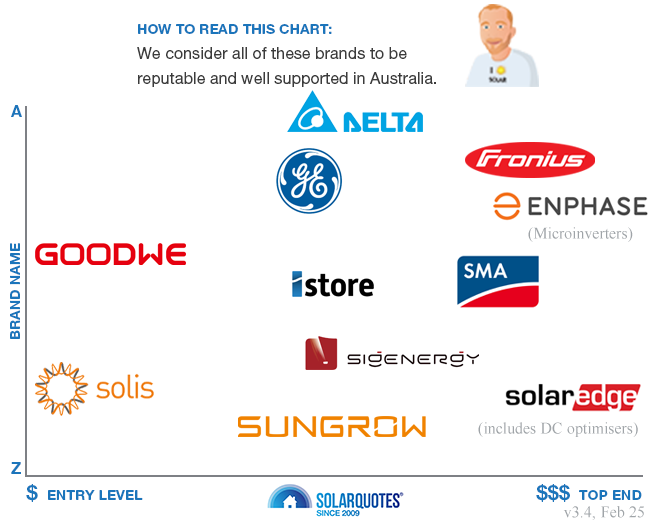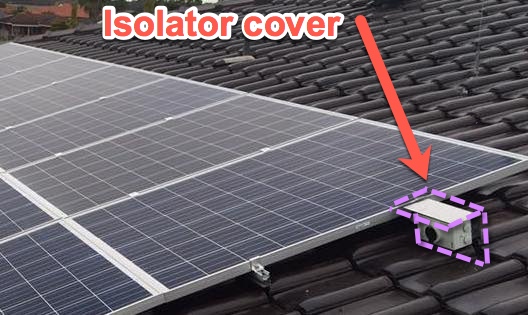Five Critical Factors When Choosing A Solar Installer
By Finn Peacock
Chartered Electrical Engineer, ex-CSIRO & Founder of SolarQuotes.com.au
In Australia, the most important factor when choosing a solar panel installer in 2025 is ensuring they are accredited by “Solar Accreditation Australia (SAA)”.
This is a qualification the person installing needs in order for the system to be eligible for whatever rebates and subsidies are available. Even more important, it means you can be confident the installer has been trained in the safe installation of solar power systems. Finally, it’s simply a requirement for any grid-connected system.
If you get 3 quotes through this website, you can rest assured all the businesses on my books are accredited by the SAA.
Once you have a number of quotes, how do you choose a company?
There are 4 main criteria you should consider:
1. Warranties / Performance
What performance warranties does the supplier company provide? Even top-quality solar panels degrade a small amount each year, but your supplier should provide a written performance guarantee that covers the performance of your panels over at least 25 years.
Unfortunately, the solar panel performance guarantee is easy for the manufacturer to wriggle out of. The solar panel warranty you can depend on is the solar panel product warranty. This should be 15 years minimum.
As for inverters, these should carry at least a 5-year warranty, but ideally 10 or more years.
General warranty guidelines
- Panel performance warranty: At least 25 years
- Panel product warranty: At least 15 years
- Inverter warranty: At least 5 years
If your inverter warranty is less than 10 years, you can often extend the warranty for a few hundred dollars out to 10 (or even more sometimes). A 10-year warranty on the inverter is a good idea, as the inverter is the most likely hardware item to fail prematurely.
With regard to workmanship, this should carry at least a 5-year warranty.
Check an Australian entity backs the solar panel and inverter warranty. In the past, I’ve seen cheapo deals where the Chinese manufacturers warranty states the owner has to post the panels back to China at the customer’s cost to get them tested!
Ask the installation company how you will know if your system performs properly. Some contractors may monitor your system over the internet, and others may have a service scheme where they inspect your solar power system regularly.
In the case where a system can’t be monitored remotely (which is increasingly uncommon), at the very least, the company should come back after you have had the system for a month or so to look over the electricity production figures and confirm you are getting the performance they promised.
For more information on warranties and consumer rights, I recommend reading this article.
While on the topic of warranties, learn about the SolarQuotes Good Installer Guarantee. It provides added peace of mind to Australians using my service to arrange an installation.
2. Cost
Obviously, this is important, but it may not be the most significant factor in your purchase.
Remember, this is a system you will depend on every day for 20-30 years, so you must have a system offering the quality and performance you are happy with.
As with most things, you generally get what you pay for.
If you have been offered a system that seems spectacularly cheap, then you may want to read my article on the high cost of cheap solar – it highlights some of the drawbacks common to super-cheap solar deals.
If you are wondering what a reasonable ballpark price is for a decent solar power system, typical fully-installed costs can be found in my solar panel price guide.
3. Craftsmanship
A well-installed solar power system can be a beautiful thing.
What kind of mounting system does your contractor use, how does it look and does it allow air to flow under the panels? There should be a 100mm gap between the roof and the panels, and they should never overhang the edge of the roof.
Your solar power system will be operating in one hell of a harsh environment – under the Australian sun – and unprotected cables will not last more than a couple of years on your roof. Don’t accept an install that doesn’t have all external wires in conduit if you want the system to last 20+ years – and good quality UV-protected conduit at that.
If your installation calls for a DC isolator on the roof, it’s mandatory to have a metal shade that totally covers the switch housing.
We advise removing rooftop isolators wherever possible, but if you’re having a 5-year service done, these covers are an easy retrofit for isolators on pre-existing systems.
Ask for some referrals and look at previous installations if possible. Inspect the solar installation company’s workmanship and overall simplicity of the installation.
Things to look at
Do they use stainless steel nuts and bolts to prevent galvanic corrosion with aluminium framing?
Have they used an insulating separator to prevent galvanic corrosion if there is an aluminium frame on a tin roof? (Galvanic corrosion is where dissimilar metals react to each other and corrode.)
With the inverter – are all the cables tidily attached to the wall (ideally in trunking)?
Is the inverter protected from direct sun (otherwise, it will not last long)?
It can also be a manufacturer warranty requirement the inverter is installed out of direct sunlight.
Ask the installer how many installs they do in a day. For 6kW+ installations, more than 1, and they will be too rushed – in my opinion.
4. Compatibility
Having a good relationship with your contractor matters for such an important project. A good relationship will ensure any problems are fixed quickly and in a mutually beneficial way.
Choose an installer who you are compatible and comfortable with. For example: If you like to ask loads of detailed questions, go with someone who enjoys explaining things in terms you can understand!
5. Questions To Ask An Installer
Here’s a list of questions you may like to ask a potential installer:
Design:
- Who designs my solar power system?
- Is the designer accredited by the SAA (not just the installer) ?
- Have you oversized the solar panel array relative to the inverter capacity?
- If the panels are installed on different roof areas facing slightly different directions, will you use an inverter with separate inputs for each string of panels, or DC optimisers or micro-inverters?
- Is there any shade on my roof? How much will it affect my output? What techniques are you using to mitigate shade?
- How much of my solar energy do you expect me to self consume, and how much electricity will be exported?
- Have you designed the system to maximise electricity self-consumption. e.g. by considering East/West arrays?
- Have you considered energy management to increase self-consumption? e.g. diverting excess solar to my hot water system?
- Have you considered DC optimisers or micro inverters to improve energy yield?
- Can I monitor
- My solar system performance?
- My household energy use? (really useful for energy efficiency and self-consumption)
Hardware:
- What brand of solar panels do you use? Premium or budget?

- What brand of inverter are you using? Is it a premium brand or budget?

- Will you include a stainless steel/aluminium rooftop isolator cover to protect the isolator (if used) from the sun?

- If I have to deal with the panel or inverter manufacturer in the future, do they have an Australian office?
Installation
- Does the price quoted include all the necessary metering changes and paperwork for my local electricity supplier? (trust me – you don’t want to have to organise this yourself!)
- Who does the electrical hookup to the grid?
- Can you provide me with references in my area?
- What is the lead time from my deposit payment to getting the system installed and electricity from the solar panels (including the new meter)? Can I have this in writing?
- Have we agreed on where the inverter will go? Will you place the solar inverter in a shaded position? Will you make the extra effort to mount it in my garage if my garage is suitable?
- Have we agreed on where all the cables will go and where any conduit will be visible?
- Are the installers employed (and trained) by you, or are they subcontracted?
- Do I get a documentation package as per SAA guidelines?
Warranties
- Do you give an accurate, written estimation of system electricity production with your solar quotes? What is my comeback if I don’t get that production?
- How do I know if my system is performing?
- What can I expect my post-solar electricity bill to be if my consumption stays the same? Can I have that in writing?
- What is the installation warranty?
Batteries
- If I get solar batteries in the future, where will I place them? (Ideally, the inverter should be near the location of any future batteries).
- How do I connect batteries in the future?